President Rodrigo Duterte’s statement Friday that he was “a bit pessimistic now” about the Bangsamoro peace process and “a little bit worried that nothing will come out of this” got Moro communities and other peace stakeholders confused and worried as to where the Duterte peace roadmap is headed.
Guiamel Alim, executive director of the Kadtuntaya Foundation and a member of the Council of Elders of the Consortium of Bangsamoro Civil Society, told MindaNews that the President’s statement “will weaken the resolve to the peaceful resolution of the Bangsamoro Question. It sends signal to the failure of the peace process. Masamang pangitain (Bad omen).”
Duterte, the first Mindanawon to become President, has repeatedly vowed to address the historical injustices committed against the Bangsamoro and to honor all signed peace agreements.
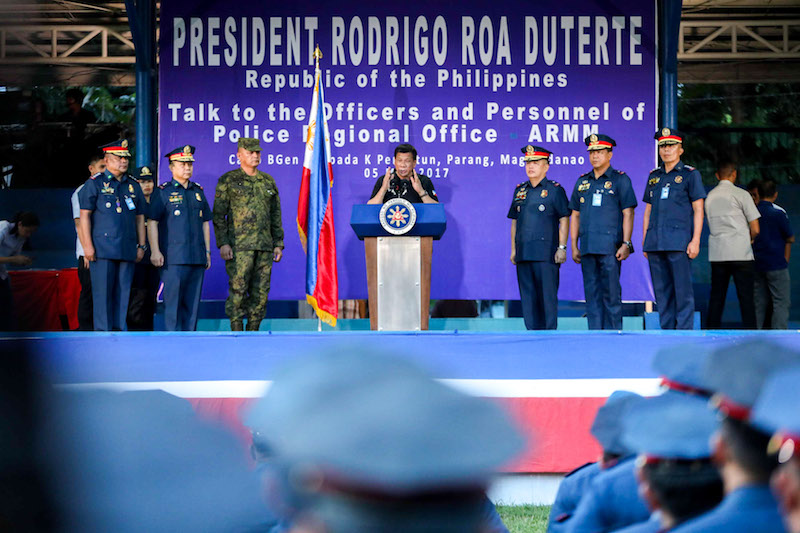
President Rodrigo Roa Duterte, tells policemen during his visit to the Police Regional Office-Autonomous Region in Muslim Mindanao (PRO-ARMM) Headquarters in Parang, Maguindanao on May 5, 2017, that he is becoming “pessimistic” and “a little bit worried” on what will come out of the Bangsamoro peace process. Ace Morandante / PRESIDENTIAL PHOTO
National media reports point to Duterte’s pessimism supposedly over forging a peace deal with the Moro groups. But there is no peace deal to be forged as peace agreements have been signed with the Moro National Liberation Front (MNLF) and the Moro Islamic Liberation Front (MILF) and are on their implementation phases: the Comprehensive Agreement on the Bangsamoro (CAB) with the MILF signed in 2014 and the Final Peace Agreement (FPA) with the MNLF signed in 1996.
Before Duterte gave his “pessimistic” remark to policemen in Camp Pendatun in Parang, Maguindanao on May 5, the 21-member Bangsamoro Transition Commission (BTC), the body tasked to draft the Bangsamoro Basic Law (BBL) as mandated by the CAB, has been holding committee hearings and according to BTC chair Ghazali Jaafar, will hold sessions on May 9 to 11 and will submit the draft BBL to the Office of the President in the first week of June, not May 15 or 18 as earlier planned.
The BBL translates into law the provisions of the peace agreement, to pave the way for a new autonomous political entity that would replace the Autonomous Region in Muslim Mindanao (ARMM) which will be deemed abolished when the BBL is ratified.
While the BTC is busy working on the draft BBL, the peace implementing panels of the government and MNLF faction under founding chair Nur Misuari, are awaiting their schedule to call on the President so they could begin their formal meetings aimed at crafting an amendatory law to strengthen the ARMM.
Duterte is the seventh Philippine President since Marcos to attempt to finally address the Bangsamoro Question and implement the GPH-MNLF’s 1976 Tripoli Agreement of 1976 and the1996 FPA, and the GPH-MILF’s 2012 Framework Agreement on the Bangsamoro (FAB) and the 2014 CAB.
“Harmonize”
President Duterte is expected to certify as urgent a draft Bangsamoro bill when he delivers his second State of the Nation Address before Congress on July 24.
It’s a race against time for both the MILF and MNLF peace tracks as the President said during a press conference prior to his departure for the Middle East on April 10 that he will certify for urgent passage in Congress only one draft Bangsamoro law.
He also said he would call on all Moro revolutionary leaders to a meeting to come up with a consensus on how to move forward in implementing the legislation aspect of their peace agreements.
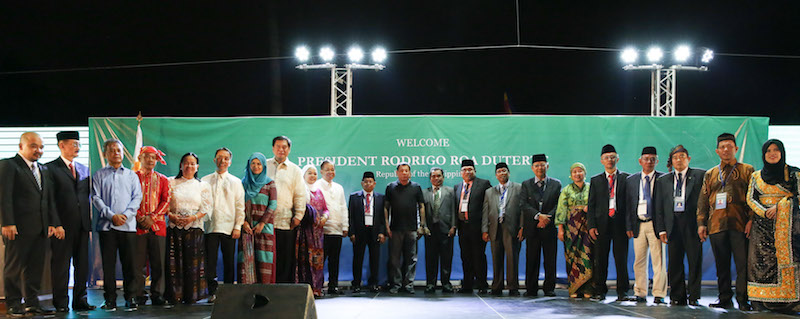
The 21 members of the Bangsamoro Transition Commission (BTC) with President Rodrigo Duterte (center) at the launch on 24 February 2017 at the Garden Pavilion of the Waterfront Insular Hotel. TOTO Lozano / Presidential Photo
The BTC was launched on February 24 in this city and started work immediately. Until now, however, the Department of Budget and Management (DBM) has yet to release its funds. BTC Commissioners are spending their personal funds so they can proceed with the drafting.
The BTC is composed of 11 nominees from the MILF and 10 from the government (GPH), three of whom were nominated by a faction of the Moro National Liberation Front (MNLF) under Muslimin Sema (now under Yusoph Jikiri).
The BTC’s composition was expanded from 15 under the Aquino administration to 21 under the Duterte administration to include other sectors, particularly the MNLF, to craft a draft bill that would incorporate the provisions of the MILF and the unimplemented provisions of the MNLF peace agreements.
The MNLF faction under founding chair Nur Misuari, however, did not want to be part of the BTC. In November last year, Secretary Jesus Dureza announced a departure from the peace roadmap by creating a separate peace implementing panel for the MNLF-Misuari faction.
Pessimistic, worried
What brought about Duterte’s “pessimistic” statement is apparently due to the perceived lack of unity among Moro revolutionary leaders.
Duterte said he has been talking with the MILF and MNLF “but apparently you’d notice nag-aagawan sila ng kampo ngayon (they’re fighting over camps). So I’m at a loss even.” Duterte did not say where this supposed fighting-over-camps happened but MindaNews sources said what was reported to Duterte was a personal feud over land between an MNLF member and an MILF member.
“I was very optimistic before but I’m a bit pessimistic now. Kasi si (Because) Nur is not, is keeping his silence. But he talks to me in private,” he said. Nur refers to Nur Misuari.
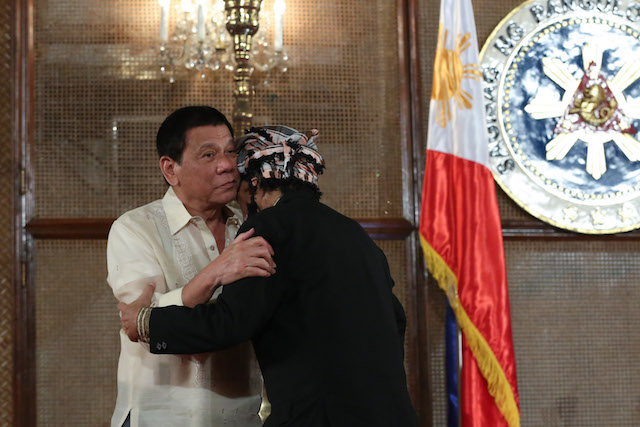
He said Misuari has “misgivings” about the MILF which broke away from the MNLF in the late 1970s following the failed implementation of the 1976 Tripoli Agreement, the Bangsamoro Islamic Freedom Fighters (BIFF) which broke away from the MILF in March 2010 following the aborted formal signing of the already initialled GPH-MILF Memorandum of Agreement on Ancestral Domain and “lahat-lahat na,” apparently referring to other armed Moro groups.
“It used to be a convoluted thing. Kaya pati ako, ‘di naman kinabahan (That’s why even I, I am not afraid) but I’m a little bit worried that nothing will come out of this,” Duterte added.
Secretary Jesus Dureza, Presidential Adviser on the Peace Process told MindaNews that there is an “urgent need for all Bangsamoro factions to converge in accordance with the Duterte peace roadmap.”
“We all have to pursue an ‘inclusive’ approach. Although we have diverse tribal groups, maintaining factionalism up to now as what happened in the past, will not help in effectively addressing what the President refers to as the historical injustice similarly and commonly suffered by all Muslims, irrespective of tribal or territorial entitlements,” Dureza said.
Maguindanao Governor Esmael Mangudadatu told MindaNews the President’s remarks “should be viewed as a clarion call to all stakeholders to show and prove their commitment to achieve the long cherished dream of all Mindanawons, that is, real and lasting peace.”
Consolidate and Converge
The Bangsamoro Peace and Development Roadmap approved by the President in July has two tracks: legislative and federalism. First on the list under the legislative track is to “consolidate and converge all peace agreements and legislations.”
The BTC was expanded from 15 to 21 precisely to make the drafting of the proposed Bangsamoro law “more inclusive.”
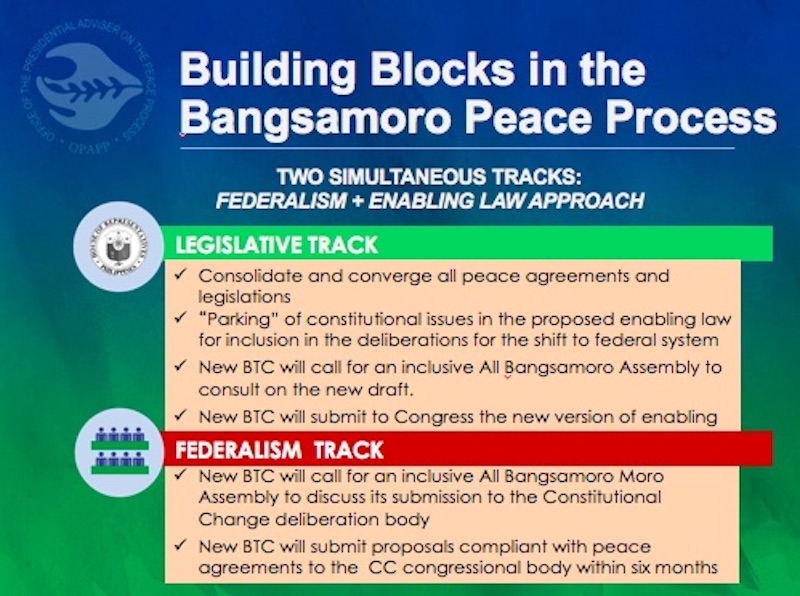
From a Powerpoint slide of the OPAPP on the Bangsamoro Peace and Development Roadmap
The MILF’s Al Haj Murad Ebrahim and the MNLF faction under Jikiri-Sema have been working on “harmonizing” the provisions of the CAB and the unimplemented provisions in the FPA into the BBL in the latter part of the Aquino administration. Today, their MNLF faction is represented in the BTC that is drafting the BBL.
“We are one,” BTC chair Ghazali Jaafar, the MILF’s 1st Vice Chair, told MindaNews. Jaafar said the MILF and MNLF faction with them acknowledge Misuari’s leadership in the Bangsamoro struggle but noted that other leaders have emerged since the 1970s.
It is only Misuari who has distanced himself from the MILF and other MNLF leaders, calling them “traitors” to the Bangsamoro cause. (Misuari was unseated as MNLF chair in 2001 by a 15-member Executive Council that includes Sema and Jikiri, who took over the MNLF leadership and named him Chair Emeritus. Misuari was then ARMM Governor but was criticized for absenteeism).
Among all the Moro revolutionary leaders, however, it is Misuari the President is closest with.
Misuari and the President became friends when Duterte was still mayor of Davao City. Misuari even described Davao City as the “official capital of the Bangsamoro Republik” during a rally here in October 2012, a week after the signing of the FAB. Misuari was introduced in that rally as “President of the Bangsamoro Republik.”
Bangsamoro Coordination Forum
The Organization of Islamic Cooperation (OIC) stepped in in 2010 to get the MNLF and MILF leaders to sit down under the Bangsamoro Coordination Froum (BCF) and “harmonize” the peace agreements by incorporating the “most outstanding features of the peace agreements into the enabling law that would govern the Bangsamoro.”
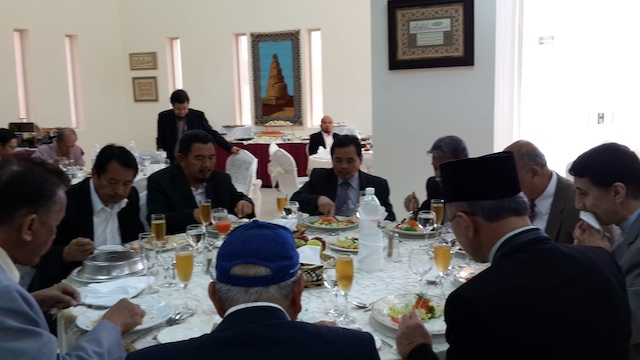
SHARING A MEAL. Leaders of the MNLF and MILF share a meal in Jeddah where they met on invitation of the OIC Secretary General in June 2014. L to R: Randolph Parcasio of MNLF-Misuari, Muslimin Sema of the MNLF, Mohagher Iqbal of MILF. Partly hidden beside Iqbal is Hatimil Hassan of the MNLF. Photo courtesy of Prof. Abhoud Syed Lingga.
Prof. Ekemelddin Ihsanoglu, then Secretary-General of the OIC, initiated the talks between Misuari and MILF chair Al Haj Murad Ebrahim on May 18, 2010 in Dushanbe, Republic of Tajikistan, where both leaders agreed that unity is indispensable to the success of the Bangsamoro struggle and that there are no basic differences between their Fronts as both are seeking to achieve peace, justice and a fair solution to the problems of the Bangsamoro people.
At the 43rd Session of the Council of Foreign Ministers held in Tashkent, Uzbekistan, on 18-19 October last year, the OIC expressed its “support and expectation” for the passage of the BBL under the Duterte administration.
It also called upon Misuari and Murad “and all other leaders of the Moro people to close ranks and narrow the gap between them for the purpose of finding common grounds to preserve the gains of the previous agreements in order to incorporate these gains in the enabling law and utilizing the Bangsamoro Coordination Forum as the main venue for that purpose.”
Squandered opportunity
Reacting to the President’s “pessimistic” remark, retired Professor Rufa Guiam, said: “Honestly I do not know where this remark is coming from. Where is his campaign pitch to address historical injustice sa mga Bangsamoro?.. Why did he create the implementing panel when he does not believe that this process is going anywhere by being pessimistic about it?”
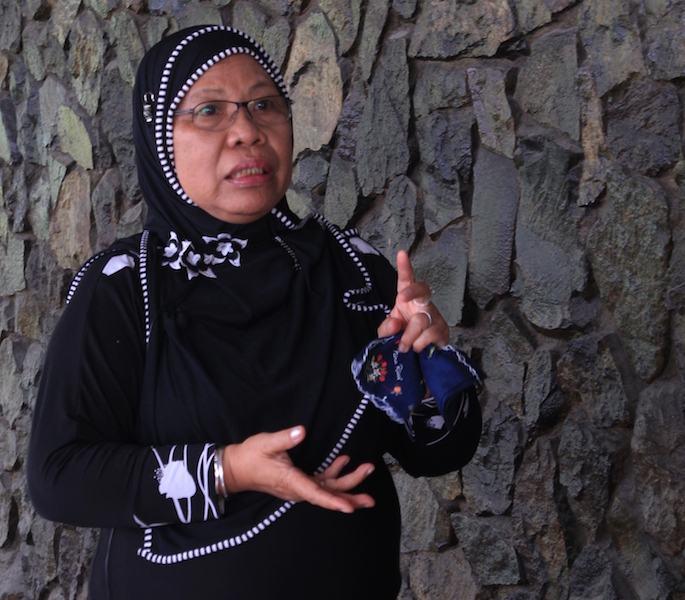
Prof. Rufa Cagoco-Guiam stresses a point on the role of Bangsamoro women in conflict and peacebuilding. MIndaNews photo by GG BUENO
In March, Guiam told MindaNews she expected Duterte would have met with the key Moro revolutionary leaders instead of set them apart by creating separate implementing panels.
“As a President riding high on a popularity vote and perception of most constituents in the whole country, he was supposed to be negotiating with all these leaders, with different groups on a powerful level… He had that maximum position of strength. He could have used that when he dealt with these groups. He could have said, ‘okay I want you to put your acts together because I’m in a position of strength, I could easily say I’ll put the whip on you, if you don’t follow what I want, I can bring you back to jail or do something to you’.”
She said Duterte, who is so popular, “squandered that opportunity” as did Cory Aquino when she was “riding on the crest of popularity and she didn’t negotiate for the writing off of our debts .. she had that popularity, she could have done that and I think this one (Duterte’s) is another missed opportunity.”
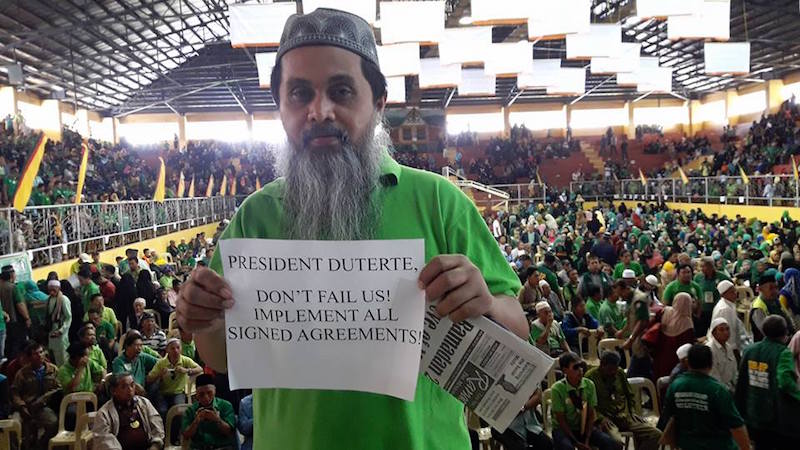
Agakhan “Binladen” M. Sharief, chair of the Bangsamoro National Movement for Peace and Development shows a message for President Duterte during the provincial assembly of the United Bangsamoro Justice Party at the Dimaporo Gymnasium, Mindanao State University (MSU) main campus on Saturday, in response to the President. Sharief actively campaigned for Duterte during the Presidential campaign. Photo courtesy of DRIEZA A. LININGDING
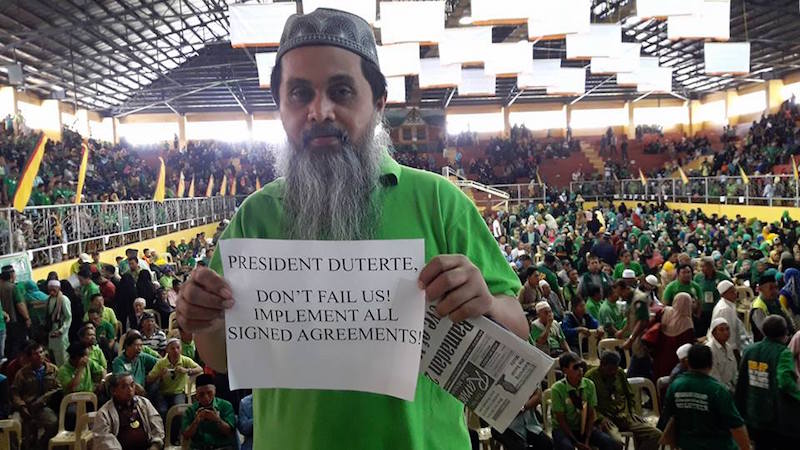
Agakhan “Binladen” M. Sharief, chair of the Bangsamoro National Movement for Peace and Development showed a message for President Rodrigo Duterte during the provincial assembly of the United Bangsamoro Justice Party at the Dimaporo Gymnasium, Mindanao State University (MSU) main campus on Saturday, in response to the President.
He raised a white sheet of paper with this message: “President Duterte, Don’t fail us! Implement all peace agreements!”
http://www.mindanews.com/peace-process/2017/05/dutertes-pessimistic-remark-on-the-bangsamoro-peace-process-worries-confuses-stakeholders/

No comments:
Post a Comment
Note: Only a member of this blog may post a comment.